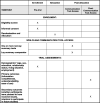Master protocol for a series of cohort-based randomized controlled trials to test tools to communicate research results to study participants and others with relevant lived experience: the SPIN-CLEAR Trials
- PMID: 40340935
- PMCID: PMC12060389
- DOI: 10.1186/s13063-025-08846-2
Master protocol for a series of cohort-based randomized controlled trials to test tools to communicate research results to study participants and others with relevant lived experience: the SPIN-CLEAR Trials
Abstract
Background: Research results are often not communicated to study participants or others with relevant lived experience. Effective communication of research results would help study participants understand their contribution to research and could improve trust in research and likelihood of research participation. Few randomized controlled trials (RCTs), however, have compared the effectiveness of research communication tools, and it is not known which tools work best for different people. We will conduct the Scleroderma Patient-centered Intervention Network-Communicating Latest Evidence and Results (SPIN-CLEAR) trial series via the multi-national SPIN Cohort to compare tool effectiveness. Primary objectives of each RCT will be to compare tools based on (1) information completeness, (2) understandability, and (3) ease of use. We will additionally evaluate comprehension of key aspects of disseminated research; likelihood that participants would enroll in a similar future study; and, for all primary and secondary outcomes, outcomes by participant characteristics (gender, age, race or ethnicity, country, language, education level, health literacy).
Methods: An advisory team of people with systemic sclerosis (SSc, also known as scleroderma) participated in developing research questions, selecting outcomes, and designing the series of parallel-arm RCTs that will each compare two or more tools or tool variations to a plain-language summary comparator; the common comparator will facilitate across-trial comparisons. In each RCT, people with SSc and researchers will select a recent SSc research study to disseminate. Tools will be developed by experienced tool developers and people with SSc. SPIN Cohort participants (current N eligible = 1522 from 50 SPIN sites in Australia, Canada, France, UK, USA) and additional participants recruited via social media and patient organization partners who consent to participate will be randomized to a dissemination tool or plain-language summary comparator and complete outcomes. Analyses will be intent-to-treat and use linear regression models.
Discussion: Each trial in the planned series of trials will build upon knowledge from previous trials. Results will contribute to the evidence base on how to best disseminate results to study participants and others with relevant lived experience.
Trial registration: ClinicalTrials.gov NCT06373263. Registered on April 17, 2024 (first trial in series).
Keywords: Knowledge translation; Patient and public involvement; Patient engagement; Patient-oriented research; Randomized controlled trials; Research dissemination; Scleroderma; Systemic sclerosis.
© 2025. The Author(s).
Conflict of interest statement
Declarations. Ethics approval and consent to participate: The SPIN Cohort was approved by the Research Ethics Committee of the Jewish General Hospital, Montreal (JGH REC Protocol #12–123), and by ethics committees of each recruiting site. The SPIN-CLEAR trial was approved by the Research Ethics Committee of the Centre intégré universitaire de santé et de services sociaux du Centre-Ouest-de-l’Île-de-Montréal (#2024–4165). All participants will provide electronic consent via Qualtrics prior to participating in the study. Consent for publication: Not applicable. Competing interests: All authors declare that they have no competing interests.
Figures
References
Publication types
MeSH terms
Associated data
Grants and funding
LinkOut - more resources
Full Text Sources
Medical
Miscellaneous



